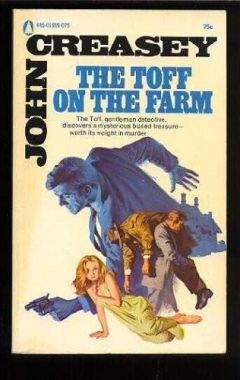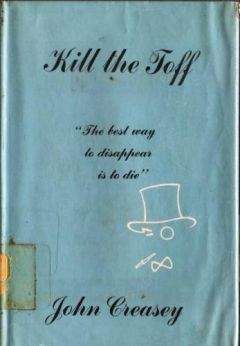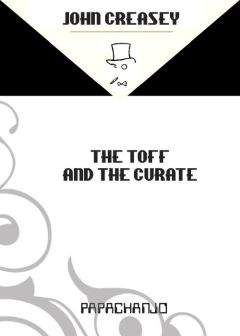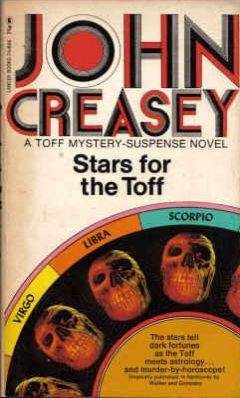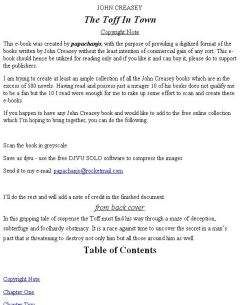John Creasey - The Toff and The Sleepy Cowboy
На сайте mybooks.club вы можете бесплатно читать книги онлайн без регистрации, включая John Creasey - The Toff and The Sleepy Cowboy. Жанр: Прочее издательство неизвестно,. Доступна полная версия книги с кратким содержанием для предварительного ознакомления, аннотацией (предисловием), рецензиями от других читателей и их экспертным мнением.
Кроме того, на сайте mybooks.club вы найдете множество новинок, которые стоит прочитать.
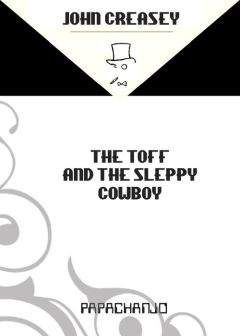
John Creasey - The Toff and The Sleepy Cowboy краткое содержание
The Toff and The Sleepy Cowboy читать онлайн бесплатно
His heart lurched until he realised that the driver was Grice’s man.
“Where are you going, Mr. Rollison?” he asked, severely.
“To the Globe newsroom — I want to find out if they’ve any news of King.”
“If we lose you we can’t be responsible for what happens.”
“No,” agreed Rollison. “I hereby absolve you. Why doesn’t one of you come along and hold my hand?”
“That’s exactly what we’ll do,” the driver replied, and his companion got out on the other side.
Rollison and a massive, black-jowled detective officer walked together along narrow streets, past huge, old-fashioned buildings, to the Globe offices in a side street. They went upstairs to the newsroom together and the Yard man looked dubious when the News Editor, an old acquaintance, carried Rollison off to a sanctum sanctorum, small, choc-a-bloc with hide armchairs, and a huge desk along one side.
“Rollison,” said the News Editor, whose name was
Green, “we have undoubtedly narrowed down the search for this actor, King.”
Rollison’s heart began to beat fast.
“Beyond any doubt?”
Green, a very thin, very sharp-featured man with a high dome of a forehead, answered without hesitation:
“Beyond doubt. He’s been in a television series re-cently and one of the cameramen on the crew which makes the show lives in Clapham. He’s seen King drive to Clapham Common several times. A woman who watches the show regularly lives in a flat in a house overlooking Clapham Common; she says she saw King go into a corner house opposite the Common yesterday morning. He’d been there two or three times before. She’s certain because she’s been dithering about whether to waylay him and ask for his autograph.”
Rollison asked, bleakly: “Any other evidence?”
“We’ve had a greater concentration of reports that he’s been seen in the Battersea and Clapham Common area than anywhere else,” Green told him. “And so have the Echo and the Record. I don’t think there’s much doubt.”
“The house is the Browns’ house, of course,” Rollison said.
“Yes.”
“Thanks,” said Rollison. “Give Bill Grice a call at the Yard and tell him I hope to see him within half an hour. It will depend on the traffic whether it takes any longer.”
“I’ll tell him,” promised Green, and as they stood up he went on: “May I add my word to the thousands you must have had about last night? My men who were there were converted from sceptics to convinced Toffophiles in a matter of seconds.”
Rollison made his usual gesture, a self-disparaging wave of his hands in front of his chin. “I’m serious, believe me,” Green insisted. He walked to the lift with Rollison, picking up the massive detective officer on the way. “Be careful, won’t you?” he said as the lift doors opened. “You’re not a man we want to lose.”
18
The Browns’ House
“Now YOU CAN SEE for yourself,” Grice said.
He stood by Rollison’s side in a small room on the same floor of the Yard as his office, in front of a map of London which was pasted on panels and hung on one wall. A door behind them was open and the clatter of typewriters and the chatter of men’s voices came through clearly. A man on one side held a box of colour-headed pins in one hand; as each new report of King having been sighted came in, he stuck in another pin.
By far the largest concentration was in the Battersea and Clapham area, and easily the thickest grouping of brown-headed pins was at a spot on Clapham Common. The common was shown in green, and all the streets nearby in black and white; and individual houses were shown as tiny rectangles or squares. At least fifty pins were clustered near that spot. Some distance away, nearer the heart of London, were other groupings, one near Rubicon House, Chelsea, and one at the converted theatre where the television series was made.
“We don’t stick a pin in unless the report seems convincing,” said Grice. “For every one you see here the newspapers must have had twenty other reports. There can’t be any doubt, Rolly; King is at the Browns’ house where he’s often been before. No wonder Loman was warned off!”
“No wonder,” echoed Rollison. “Any word of Hindle?”
Grice said softly: “Some reports, yes.” He pointed to some ordinary steel pins without coloured heads, which were also clustered near the Browns’ house. “Reports that a man answering Hindle’s description have come fairly frequently. Seven reports — as you see there are seven pins — seem reliable. If they are, Hindle and his wife went to the Browns’ home about an hour and a half after the fire at Rubicon House yesterday afternoon.”
“Well, well,” Rollison said, heavily.
“So,” said Grice, “we shall move in.”
Rollison looked at him broodingly.
“Must you?” he asked.
“What a thing to ask! Of course we must. Hindle must be questioned about employing the motor-cyclist, and King —” Grice broke off. “It’s true there’s no evidence except yours that King is involved, and yours is circumstantial, but he has to be questioned.”
“Yes,” said Rollison, and then with a great effort: “Indubitably.”
Grice gave him a long, sour look.
“What’s on your mind?” he demanded.
“Hand grenades,” Rollison replied.
Grice made no comment.
“Presumably you have the house cordoned off,” Rollison went on. “Presumably at a given signal your men will move in. How many? Ten? Twenty? Thirty?”
“At least thirty,” Grice said, uneasily.
“How many casualties do you think you’ll have?”
“We shall take every possible precaution,” Grice growled.
“Soothing for the widows,” observed Rollison.
“Rolly, we have reason to believe two wanted men who may be responsible for these murderous attacks are in the house, and that the Browns are giving them shelter. We simply have to go in.”
Rollison looked at him levelly, and after a while said very quietly:
“It will be a mistake, Bill.”
“You simply don’t understand!” Grice insisted, and now his voice was very rough. “If there are more grenades and fire bombs in that house, if the Browns are the distributors, we have no time to spare.”
“You could ask for military help,” Rollison pointed out.
“And perhaps create a crisis situation.”
“Yes,” Rollison said. “Yes. Bill.”
“No,” Grice growled.
“Bill,” Rollison repeated, “you don’t really have a choice. If some scatterbrained private individual is prepared to visit the Browns’ house and look round, you have to let him. No policeman could be sent on his own — you know that perfectly well. One policeman is too many. But they would let me in.”
“There is no evidence at all that they would let you out.”
“No,” agreed Rollison. “However — I think I have one rod ready for them which might pickle nicely.”
“Rolly,” Grice said with absolute decisiveness. “I will not let you go.”
“Bill,” Rollison replied, very quietly, “you know perfectly well you can’t stop me. I can go where I like as a private individual. You have no grounds at all for detaining me. Have you?”
Grice did not reply.
“You know you haven’t,” Rollison went on as quietly as before. “But I don’t want Jolly to know where I’ve gone — nor Tommy Loman, who will tell Jolly and will also want to come with me.”
“I’d rather he went than you,” Grice growled. “But he could not hope to do any good.”
“Rolly, if these are the people who have been throwing bombs at you, you are walking right into their arms.”
“My strength,” Rollison declared.
“I don’t follow you.”
“You’re too worked up about this affair,” Rollison told Grice, gently reproachful. “You aren’t letting your-self think clearly. They will know that you will know I’ve gone there, and if they don’t let me out, then it’s a declaration of war on the police.”
Grice said: “They may take the chance.”
“Yes,” Rollison said. “They may. It really depends on what the affair is all about.” After a few moments he went on: “There’s no reason why we shouldn’t have a time limit. Say, an hour from the time I go inside. And there’s every reason why we should lay some careful plans before I go in. By the way, may I see this New York policeman, what’s his name?”
“Luigi Tetano.”
“That’s the chap.”
“Why?” asked Grice.
“I’d like to find out other evidence he has to suggest that the doping of Tommy Loman might have been connected with the baggage racket,” Rollison said, and suddenly gripped Grice’s shoulder. “Bill, I’ve walked into trouble as ugly as this a dozen times.”
“I don’t think so,” Grice objected. “I do think —”
“Well?”
“I think you know something these people fear be-coming common knowledge,” Grice said. “It’s the only reasonable explanation of the way they’ve set out to kill you. Are you sure you don’t know what it is?”
“I don’t have the faintest idea,” Rollison answered. “Yet.”
He had a sense that Grice had acknowledged defeat, and was not going to fight any more; he also suspected that when Grice took him back to his office and went out, ostensibly to fetch Luigi Tetano, he was also going to talk to his superiors. Rollison waited by the window which overlooked Victoria Street, seething now with traffic. The rain had stopped and the sun shone fitfully, while the sky between the breaks in the white cloud was a vivid blue. Very soon, Grice came back with the American, who advanced slowly towards Rollison, saying:
“Mr. Rollison, I’m proud to meet you.”
“Oh, dear,” Rollison said. “That’s always an in-timidating way to begin. Did you really hop that plane without permission, just to follow your hunch?”
“Yes,” answered Luigi. His eyes had the brightness of a doe’s, his cheeks were soft and sallow, pale; like a woman’s. He had a bow-shaped, gentle-looking mouth.
“Then I’m proud to meet you,” Rollison said, as they shook hands.
Luigi laughed: “Thank you!”
“Lieutenant —”
“Sergeant.”
“Sergeant, why was your hunch so strong? Why did you think this cowboy from Tucson had special signifi-cance?” He saw Grice go out, and only essential busi-ness would have taken Grice away at that particular moment. The American rubbed his chin with his thumb and forefinger before replying:
“I don’t know, Mr. Rollison. I simply don’t know. Except —” He paused.
“Except what?”
“Except it seemed to me he might have something very special in his baggage for them to give him a shot and make sure he didn’t wake up in time to prevent them from claiming it.”
“Nothing else at all?” asked Rollison. He had not really expected more, and yet he was disappointed. He liked the other man, could well believe that he had taken the chance exactly as he had said, and yet . . .
“Mr. Rollison, the whole set-up seemed phoney,” Tetano declared at last. “It seemed to me they might be drawing attention to this cowhand while they were doing something else, and I wanted to find out what the some-thing else was. That’s one reason I am so mad, I allowed him to be doped in the B.O.A.C. plane, but when I saw him in his seat I got out quick to see if I recognised any of the other passengers. I didn’t and came to the conclusion it was not part of the baggage racket. Now maybe I wonder if it has anything to do with these bombthrowings. And I guess —” his eyes crinkled at the corners as he went on: “I wondered if you know more about it than you admit.”
“So Bill Grice has been talking,” Rollison remarked.
“Yes, sir, he has been talking,” replied Tetano. “He seems to think you are a cross between a saint and Machiavelli. He lives in a state vacillating between being frightened of what you’ll do next and being frightened for you.”
“Just between you and me,” said Rollison, “I think I’m a little frightened for myself, too.”
He looked up as Grice returned, pale-faced; shook hands with Luigi Tetano, who went out with a chief inspector who followed Grice in, then raised his hands in a hopeless kind of gesture.
“Still of the same mind?” Grice demanded.
“Yes, Bill.”
“I’ve instructions not to try to stop you if you’re set on going into the place,” announced Grice. “And not to encourage you, either. Rolly, I’d a thousand times rather go myself.”
“I know you would,” replied Rollison. “But if they are what you fear they are, they wouldn’t let you in. They will let me in — and they may even let me out. One thing, Bill, or rather two.”
“Anything.”
“First, don’t let Tommy Loman out of my flat,” said Rollison. “He could go to the Browns’ house and ruin everything.” Grice nodded. “Second, don’t let Luigi Tetano leave the Yard until you hear from me.” Grice looked surprised, but nodded again. “Now!” went on Rollison briskly. “I have half a dozen tear-gas cigarettes and one palm gun. Wish me luck!”
“Luck,” Grice almost groaned.
Rollison went downstairs. His Bristol was parked just round the corner, in Broadway, with two policemen watching it. No one made a move as he got in; no one followed as he pulled off and drove away. It was almost strange not to be followed by a police car. Traffic was still thick but the roads were drying except for pools in the kerbs, and there was a freshness even in the fume-laden streets, unbelievable freshness in Clapham Common, rising from the rain-soaked grass and the glistening, rain-wet leaves. He drew near the Browns’ house but did not turn into the drive. Instead he pulled in at the first available parking space along the street, and walked back. With the contrariness of autumn, the sun was shining low but brightly, and the air was warm and sticky; he was glad he had not brought a raincoat.
He turned into the house drive, and studied the garage, where the assault had been made. The rain had drowned or muddied all clues, brown and yellow and golden leaves were on the damp gravel. The M.G. was where the girl had left it the night before.
There was something left behind; a vital clue, some-where.
Tucked between the garage door and the wall of the house was a small black dress bag, with a petit point rose in pale pinks and whites and blues. That was where it must have fallen when she had been attacked. He felt the familiar shudder go through him, but did not pick the handbag up. He turned back to the arched portico of the front door, with freshly painted sides and colourful tiles on the floor. The door itself was jet black, the knocker, bell-push and letter-box old-fashioned brass; it needed cleaning.
He pressed the bell but could not hear the ringing.
People passed in the street; cyclists passed; and motorists. But all of them seemed far off and remote, although they were within earshot. He heard footfalls on the other side of the door, heard the handle turning, next a faint creak as the door opened. A man in his late twenties stood there, sufficiently like Pamela Brown for Rollison to think: it’s her brother. The man was pale and uneasy.
Похожие книги на "The Toff and The Sleepy Cowboy", John Creasey
John Creasey читать все книги автора по порядку
John Creasey - все книги автора в одном месте читать по порядку полные версии на сайте онлайн библиотеки mybooks.club.
